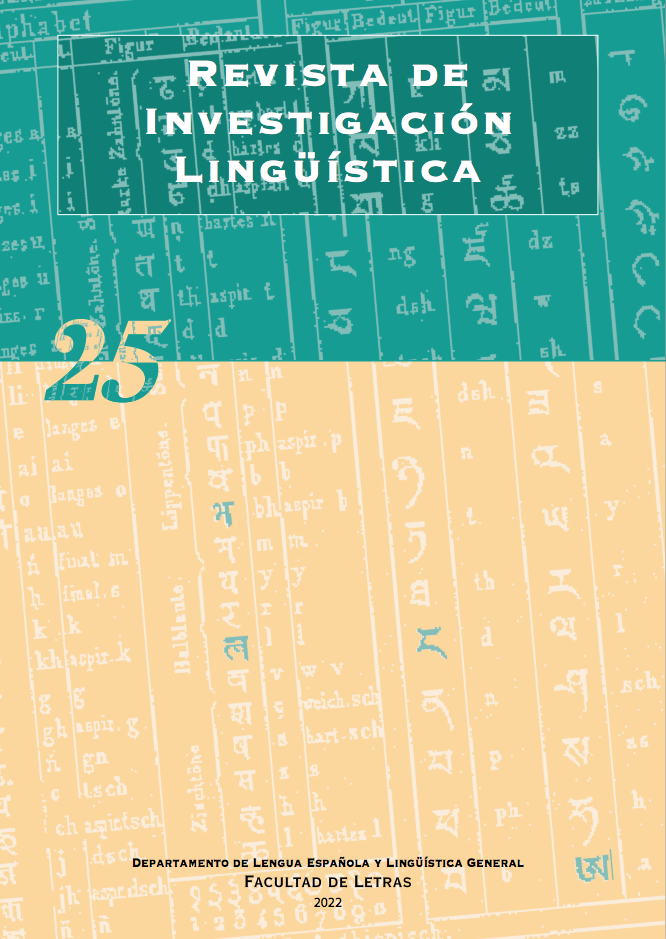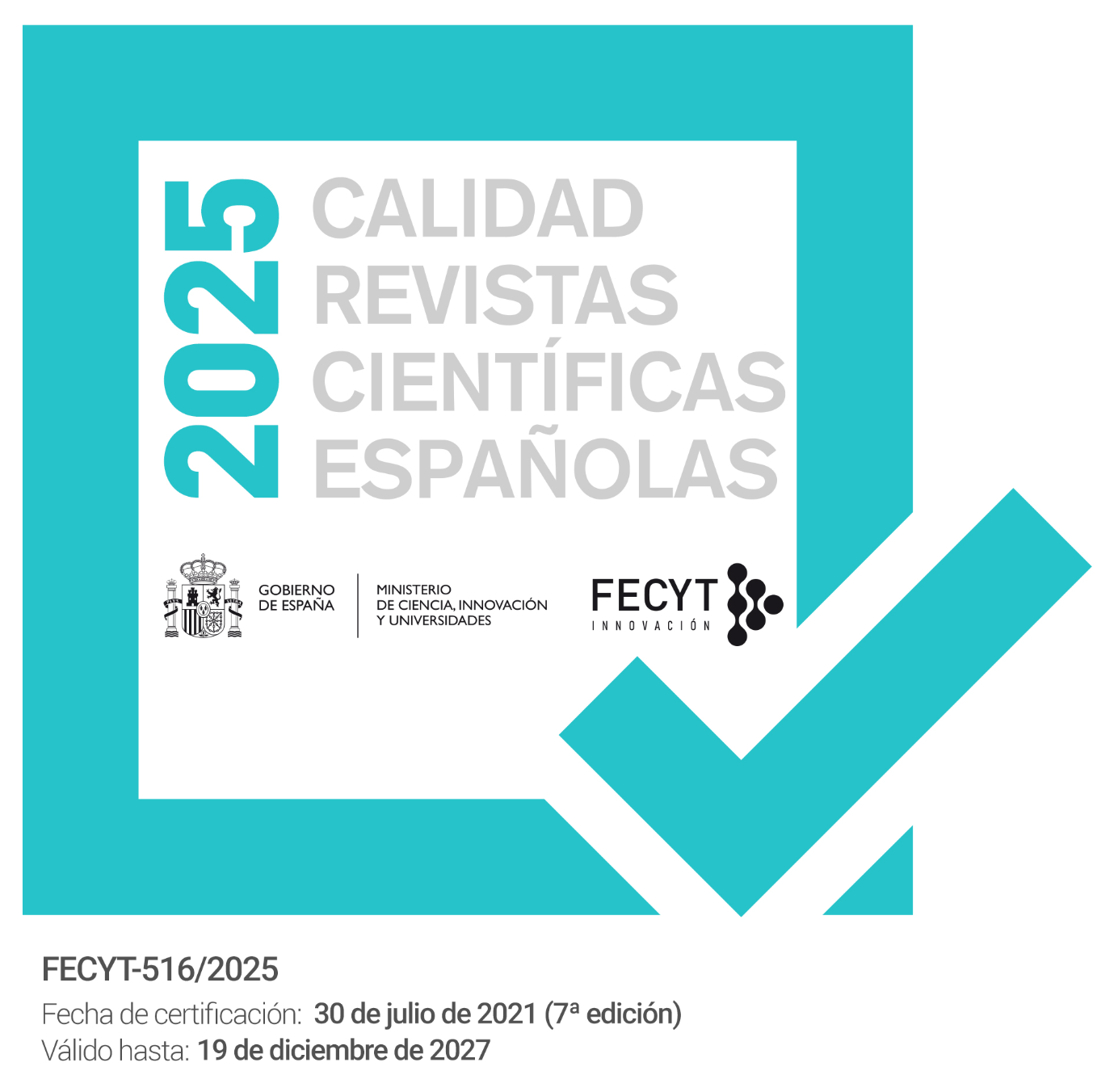Meat in the eye of the storm. Masculine identity reaffirmations and discursive polarisations on gender in the controversy over meat consumption in Spain
Abstract
The article discusses the public controversy surrounding meat consumption in Spain after the campaign launched by the Spanish Minister for Consumer Affairs Alberto Garzón. The campaign was launched in 2021 under the slogan #MenosCarneMásVida (Less Meat More Life). The debate focuses on media coverage from the perspective of gender studies and, in particular, of masculinity studies. After defining some key notions for a critical discourse approach to the topic (such as hegemonic masculinity and masculinity stress) and reviewing some sociological and psychological studies that have highlighted the close relationship between meat and masculine identity, the paper proposes a critical discourse analysis, firstly, from a multimodal perspective and, secondly, from the viewpoint of reactions in the media. The article closes with some considerations on the importance of undoing the myth of masculinity in favour of new and stimulating debates about gender identity in the 21st century.Downloads
-
Abstract624
-
PDF (Español (España))694
References
ADAMS, Carol J. (1996): La política sexual de la carne. Una teoría crítica feminista vegetariana, Madrid, Ochodoscuatro ediciones.
ARNOLD, David (1988): Famine: Social Crisis and Historical Change, Nueva York, Basil Blackwell.
BACETE, Ritxar (2017): Nuevos hombres buenos. La masculinidad en la era del feminismo, Barcelona, Ediciones Península.
BAÑÓN HERNÁNDEZ, Antonio Miguel (2018): Discurso y salud. Análisis de un debate social, Pamplona, EUNSA.
BERGER, Peter L. y Thomas LUCKMANN (2019): La construcción social de la realidad, Buenos Aires/Madrid, Amorrortu editores. [Traducción de Silvia Zuleta].
BOURDIEU, Pierre (2000[1998]): La dominación masculina, Barcelona, Anagrama. [Traducción de Joaquín Jordá].
BOU-FRANCH, Patricia (coord.) (2016): Exploring Language Aggression against Women, Ámsterdam/Filadelfia, John Benjamins. DOI: https://doi.org/10.1075/bct.86.
BUTLER, Judith (2007[1999]): El género en disputa, Barcelona, Paidós. [Traducción de M.ª Antonia Muñoz].
CAVAZZA, Nicoletta, Margherita GUIDETTI y Fabrizio BUTERA (2015): «Ingredients of Gender-based Stereoypes about Food. Indirect Influence of Food Type, Portion Size and Presentation on Gendered Intentions to Eat», Appetite, 91(1), pp. 266-272. DOI: https://doi.org/10.1016/j.appet.2015.04.068.
CAVAZZA, Nicoletta, Margherita GUIDETTI y Fabrizio BUTERA (2017): «Portion Size Tells who I am, Food Type Tells who you Are: Specific Functions of Amount and Type of Food in Same- and Opposite-sex Dyadic Eating Contexts», Appetite, 112(1), pp. 96-101. DOI: https://doi.org/10.1016/j.appet.2017.01.019.
CAVAZZA, Nicoletta y Margherita GUIDETTI (2020): Scelte alimentari. Foodies, vegani, neofobici e altre storie, Bolonia, Il Mulino.
CONNELL, Robert W. (1987): Gender and Power. Society, the Person, and Sexual Politics, California, Stanford University Press.
CONNELL, Robert W. (1995): Masculinities, Berkley, CA, University of California Press.
CORTÉS RODRÍGUEZ, Luis (2021): Aproximación al dominio Análisis del discurso y su incidencia en la lengua española. Nombres, teorías, corrientes, Almería, Edual.
COUNIHAN, Carole M. y Steven L. KAPLAN (1998): Food and Gender. Identity and Power, Londres/Nueva York, Routledge.
CRAMER, Peter A. (2011): Controversy as News Discourse, Londres/Nueva York, Springer. DOI: https://doi.org/10.1007/978-94-007-1288-1.
DENISOVA, Anastasia (2019): Internet Memes and Society: Social, Cultural, and Political Contexts, Londres/Nueva York, Routledge. DOI: https://doi.org/10.4324/9780429469404.
EGBERT, Jesse y Erin SCHNUR (2018): «The Role of the Text in Corpus and Discourse Analysis. Missing the Trees for the Forest», en Charlotte Taylor y Anna Marchi (eds.), Corpus Approaches to Discourse. A Critical Review, Londres/Nueva York, Routledge, pp. 159-173. DOI: https://doi.org/10.4324/9781315179346-8.
FAIRCLOUGH, Norman y Ruth WODAK (2000): «Análisis crítico del discurso», en T. A. van Dijk (ed.), El discurso como interacción social, Barcelona, Gedisa, pp. 367-404.
FEIRSTEIN, Bruce y Lee LORENZ (ilustrador) (1982): Real Men Don’t Eat Quiche, Nueva York, Pocket Books.
FENOLL, Vicente (2017): «Características de la interacción entre los usuarios de los medios digitales españoles en la cobertura del juicio de Francisco Camps», Textual & Visual Media, 10, pp. 189-204.
FERRARI, Angela, Letizia LALA y Filippo PECORARI (coords.) (2020): «Accordi e disaccordi in rete: aspetti linguistici, comunicativi e psicosociali», Atti del convegno internazionale, Basilea 23-24 gennaio 2020, Lingue e Culture dei media. vol. 4/20, pp. 1-220.
FIDDES, Nick (1992): Meat. A Natural Symbol, Londres/Nueva York, Routledge.
GAL, David y James WILKIE (2010): «Real Men Don’t Eat Quiche: Regulation of Gender-Expressive Choices by Men», Social Psychological and Personality Science, 1(4), pp. 291-301. DOI: https://doi.org/10.1177/1948550610365003.
GONZÁLEZ MANZANERO, Remei (2020): «Los comentarios digitales de los usuarios en los periódicos en línea: análisis de la coherencia y la interactividad», Círculo de Lingüística Aplicada a la Comunicación, 83, pp. 77-92. DOI: https://doi.org/10.5209/clac.70565.
GUASH, Óscar (2008): «Los varones en perspectiva de género», Asparkía, 19, pp. 29-38.
HELGESON, Vicki S. (1994): «Prototypes and Dimensions of Masculinity and Femininity», Sex Roles, 31, pp. 663-662. DOI: https://doi.org/10.1007/BF01544286.
KHOSRAVINIK, Majid y Eleonora ESPOSITO (2018): «Online Hate, Digital Discourse and Critique: Exploring Digitally-Mediated Discursive Practices of Gender-Based Hostility», Lodz Papers in Pragmatics, 14(1), pp. 45-68. DOI: https://doi.org/10.1515/lpp-2018-0003.
KIMMEL, Michael (1996): Manhood in America: A Cultural History, Nueva York, The Free Press.
KRESS, Gunther y Theo VAN LEEUWEN (1996): The Grammar of Visual Design. Londres/Nueva York, Routledge.
JHONANQUIER BARRERA, Nelson y Cristian Alberto PAYALEF ARAMBURU (2020): «Ídolos, masculinidad(es) y cultura de la cancelación», Actas de Periodismo y Comunicación, 6 (2). En línea: <https://perio.unlp.edu.ar/ojs/index.php/actas/article/view/6841> [04/05/22].
LINDO, Elvira (2021): «El chuletón por bandera», El País, 11/07/2021. En línea: <https://elpais.com/opinion/2021-07-11/el-chuleton-por-bandera.html> [04/05/22].
MACDONNELL MESLER, Rhiannon, Bret LEARY, R. y William. J. MONTFORD (2022): «The Impact of Masculinity Stress on Preferences and Willingness-to-pay for Red Meat», Appetite, 171(1). DOI: https://doi.org/10.1016/j.appet.2021.105729.
MANCERA RUEDA, Ana (2009): «Manifestaciones de descortesía y violencia verbal en los foros de opinión digitales de los diarios españoles», Discurso & Sociedad, 3(3), pp. 437-466.
MCNEILL, David (1992): Hand and Mind: What Gestures Reveal about Thought, Chicago, University of Chicago press.
NAKAGAWA, Sandra y Chloe HART (2019): «Where’s the Beef? How Masculinity Exacerbates Gender Disparities in Health Behaviours», Socius: Sociological Research for a Dynamic World, 5, pp. 1-12. DOI: https://doi.org/10.1177/2378023119831801.
NICHOLS, Bill (1997): La representación de la realidad. Cuestiones y conceptos sobre el documental, Barcelona, Paidós. [Traducido por J. Cerdán y E. Iriarte].
O’DOHERTY, Katherine J. y Lotte HOLM (1999): «Preferences, Quantities and Concerns: Socio-cultural Perspectives on the Gendered Consumption of Foods», European Journal of Clinical Nutrition, 53, pp. 351-359. DOI: https://doi.org/10.1038/sj.ejcn.1600767.
PACILLI, Maria Giuseppina (2020): Uomini duri. Il lato oscuro della mascolinità, Bolonia, Il Mulino.
PIETRANDREA, Paola (2021): Comunicazione, dibattito pubblico, social media. Come orientarsi con la linguistica, Roma, Carocci.
ROBLES MARTÍNEZ, Beatriz (2021) «Carne y masculinidad: por qué los hombres muy hombres comen chuletón», El País, El Comidista, 21/10/2021, En línea: <https://elcomidista.elpais.com/elcomidista/2021/10/12/articulo/1634067382_855679.html> [04/05/22].
ROSENFELD, Daniel y Janet A. TOMIYAMA (2021): «Gender Differences in Meat Consumption and Openness to Vegetarianism», Appetite, 166. DOI: https://doi.org/10.1016/j.appet.2021.105475.
ROTHGERBER, Hank (2013): «Real Men don’t Eat (Vegetable) Quiche: Masculinity and the Justification of Meat Consumption», Psychology of Men & Masculinity, 14(4), pp. 363-375. DOI: https://doi.org/10.1037/a0030379.
ROZIN, Paul, Julia M.HORMES, Myles S.FAITH y Brian WANSINK (2012): «Is Meat Male? A Quantitative Multimethod Framework to Establish Metaphoric Relationships», Journal of Consumer Research, 39(3), pp. 629-643. DOI: https://doi.org/10.1086/664970.
SAL PAZ, Julio César (2013): «Comentario digital: género medular de las prácticas discursivas de la cibercultura», Caracteres: estudios culturales y críticos de la esfera digital, 2(2), pp. 152-172.
SAL PAZ, Julio César (2016): «El comentario digital como género discursivo periodístico. Análisis de la Gaceta de Tucumán», Aposta. Revista de Ciencias Sociales, 69, pp. 158-216.
SCRETI, Francesco (2019): «Carne, carbón, y cojones. La representación de la masculinidad en anuncios suizos contemporáneos: el caso de Bell», Discurso & Sociedad, 13(4), pp. 765-807.
SMILER, Andrew (2019): Is Masculinity Toxic? A Primer for the 21st Century, Londres, Thames & Hudson.
SUMPTER, Kristen C. (2015): «Masculinity and Meat Consumption: An Analysis Through the Theoretical Lens of Hegemonic Masculinity and Alternative Masculinity Theories», Sociology Compass, 9(2), pp. 104-114. DOI: https://doi.org/10.1111/soc4.12241.
TOVARES, Alla y Cynthia GORDON (2022): Identity and Ideology in Digital Food Discourse. Social Media Interactions Across Cultural Contexts, Londres, Bloomsbury. DOI: https://doi.org/10.5040/9781350119178.
TROTTA, Daniela y Raffaele GUARASCI (2021): «How are Gestures Used by Politicians? A Multimodal Co-gesture Analysis», International Journal of Computational Linguistics, 7-1, 2, pp. 45-66. DOI: https://doi.org/10.4000/ijcol.827.
VARTANIAN, Lenny, Peter C. HERMAN y Janet POLIVY (2007): «Consumption Stereotypes and Impression Management: How You Are What You Eat», Appetite, 48(3), pp. 265-277. DOI: https://doi.org/10.1016/j.appet.2006.10.008.
YUS, Francisco (2018): «Identity-related Issues in Meme Communication», Internet Pragmatics, 1, pp. 113-133. DOI: https://doi.org/10.1075/ip.00006.yus.
Copyright (c) 2022 Journal of Linguistic Research

This work is licensed under a Creative Commons Attribution-NonCommercial-NoDerivatives 4.0 International License.
The works published in this magazine are subject to the following terms:
1. The Publications Service of the University of Murcia (the publisher) preserves the economic rights (copyright) of the published works, and favors and allows the reuse of same under the license of use indicated in point 2.
2. The papers are published in the electronic edition of the magazine under a Creative Commons Attribution-NonCommercial-NoDerivative 3.0 Spain license (legal text). Papers may be copied, used, disseminated, transmitted and publicly exhibited if the following requirements are met: i) The authorship and the original source of its publication (magazine, editorial and URL of the work) must be cited; ii) The works cannot be used for commercial purposes; iii) The existence and specifications of this user license must be explicitly mentioned.
3. Self-archiving conditions. Authors can electronically disseminate pre-print versions (version before being evaluated) and / or post-print versions (version evaluated and accepted for publication). This makes possible its circulation and diffusion earlier and with it a possible increase in its citation and reach among the academic community. RoMEO color: green.










